In this guide, we'll walk you through AI email marketing uses cases and the top ten tools on the market.
Email marketing is still as effective as ever — and many marketers claim it’s more effective today, with email marketing ROI hitting record highs.
Why? Because artificial intelligence (AI) has fundamentally changed how email campaigns are built and optimized.
With smart tools now supporting every step of the process — from drafting email subject lines right the way through to scheduling the optimal time to hit send — the quality of email marketing campaigns has never been higher. In 2025, there’s simply no excuse for shoddy output.
Your competitors are embracing these tools, and if you’re not, you risk falling behind. After all, when AI handles the heavy lifting, you can achieve in minutes what once took hours — and often to a better standard.
That said, it’s not time to replace your best marketers quite yet. The strongest results still come from the combination of human creativity and machine intelligence. AI is a tool used by skilled marketers — not a substitute for them.
In this article, we’ll explore how to leverage AI in your email marketing strategy and highlight the best tools currently available to streamline your workflow and boost results.
Table of contents
What is AI in email marketing?
Before we dive into how to get the most from AI in email marketing, let’s clarify what we actually mean by “AI.”
While “AI” is often used as a catch-all term, it refers to software that can analyze data, recognize patterns, and predict outcomes — all with minimal human input.
When referring to AI specifically in email marketing, we’re talking about AI technologies like machine learning, large language models (such as ChatGPT), and predictive algorithms.
So what does that mean in practice? AI can improve your email outreach campaigns in several key areas — from creating content and personalizing messages, to optimizing send times and predicting customer behavior.
Let’s take a closer look at where AI is making the biggest impact.
Related: Read more about AI in digital marketing including use cases, best practices, and tools
6 Practical use cases for AI in email marketing
AI is now integrated into nearly every step of the email marketing process — from generating the first line of copy to optimizing the entire customer journey.
As you’ll see, many of these functionalities — like personalization or email list segmentation — have existed in simpler forms for years. AI has supercharged them, though, significantly expanding their reach while also making them faster, smarter, and far more effective.
Here's how AI is being used in real campaigns to boost performance and save time.
1. Email content creation
The core of any campaign is the email itself — and AI can now be as hands-on or hands-off as you need it to be.
Large language models (LLMs) can generate subject lines, preview text, body copy, and calls to action in seconds. You can refine the message by giving the AI feedback, or adjust things like tone and length to fit your vision.
Which LLM you use is entirely up to you. External tools like ChatGPT or Claude are widely available, but many modern email platforms — Brevo included — are now integrating these models directly into their marketing software, so you never need to leave the editor.
Using AI for content creation saves time, helps you brainstorm in real time, and gives you a strong starting point — especially useful if you’re struggling with writer’s block.
2. Hyper-personalization
Once your content is created, AI can help tailor it to each individual recipient.
You might already be familiar with basic email personalization — such as using a subscriber’s first name in the first line. But AI takes personalization to a completely new level.
AI can dynamically adjust key parts of the email based on a user’s behavior, preferences, location, purchase history, or even predicted intent.
It can customize product recommendations, swap out images or CTAs based on past engagement, or highlight specific features a user is most likely to care about.
Gone are the days of one-size-fits-all emails. With AI, you can make each recipient feel like the message was written specifically for them — a proven way to boost customer engagement.
3. Smart segmentation
Before the email goes out, AI can fine-tune who should receive it — and why.
Traditional segments are based on static rules — like location, subscribe date, or purchase history. AI goes much further by dynamically grouping subscribers based on real-time behavior, engagement patterns, or even likelihood to convert.
This allows you to create far more sophisticated segments — and far more of them — than would ever be practical manually.
The result? Each campaign has a better chance of reaching the right people with the right message at the right time.
4. Send timing and frequency
Timing is everything. Get it wrong — like sending an email while a subscriber is asleep — and your message might be buried in the depths of their inbox by the time they check.
AI looks at all the variables and analyzes individual users behavior to determine the best time to send each email — maximizing open rates and the liklihood they engage.
It also helps manage frequency. Send too often and you risk annoying your audience or triggering unsubscribes. Send too little and you leave money on the table.
AI strikes the right balance by adapting send schedules to each subscriber’s engagement patterns rather than blasting your entire list — so your emails land when they actually want to hear from you.
5. Automated A/B testing
You’re probably familiar with the concept of A/B testing — sending out two versions of an email to see which performs better.
But AI doesn’t stop at just A and B. Because it can process huge amounts of customer data in real time, it can test multiple variables at once — think A/B/C/D testing and beyond — and automatically prioritize the best-performing version.
AI turns testing into a continuous, automated process that refines your campaigns in the background — far faster and more effectively than manual testing ever could.
By testing multiple variables simultaneously, AI accelerates the optimization process — meaning every send is more refined, more targeted, and more likely to convert than the last.
6. Predictive analytics
AI is always working behind the scenes, even after the email is sent.
Predictive analytics uses historical data, engagement patterns, and behavioral signals to forecast what a subscriber is likely to do next — whether that’s simply opening your next email, clicking a link, making a purchase, or even unsubscribing altogether.
This allows you to act proactively. You might set up an automated re-engagement email when the AI spots the tell-tale signs of churn. Or perhaps you trigger a promo code when a subscriber seems ready to buy.
And this keeps your funnel full and your audience engaged.
Top 10 AI email marketing tools in 2025
Disclaimer: This article covers the the best AI email marketing tools including our own platform, Brevo. We strive to be objective. Our suggestions are based on our own research and experience. We do not earn commissions from any links in this article.
AI is no longer just a nice-to-have in email marketing — it’s becoming essential.
From content generation and smart segmentation to predictive analytics and marketing automation, today’s tools are packed with intelligent features that help you work faster and deliver better results. If you think you can still do everything manually, you’re just giving up ground to your competitors
But whether you're a solo creator or part of a multinational’s marketing team, there’s an AI-powered email platform out there to match your needs. Below, we’ve rounded up the 10 best email marketing options available right now.
1. Brevo
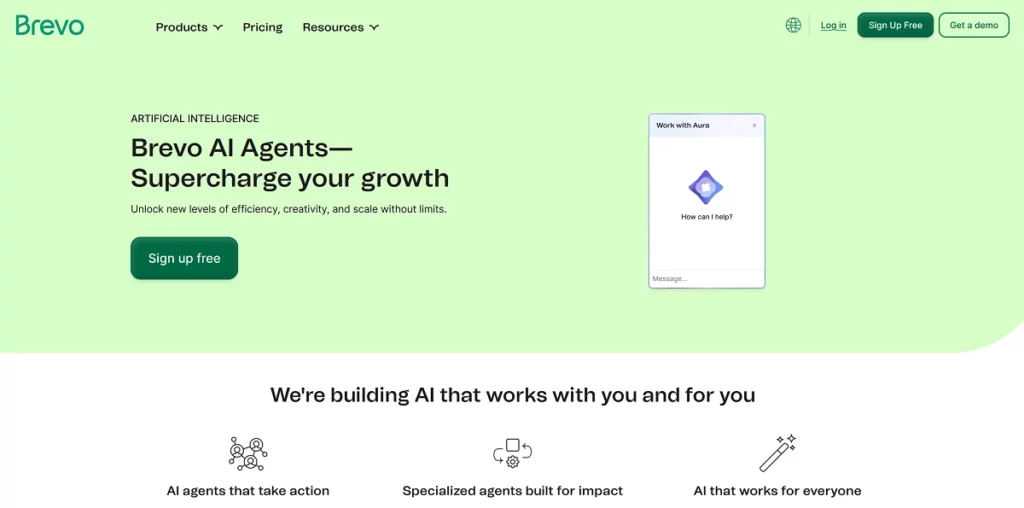
Brevo has emerged as a leader in AI-powered email marketing, offering a comprehensive all-in-one platform that combines powerful automation with intuitive usability.
Its AI agent, Aura, launched in May 2025 — the first major result of a €50 million investment in AI innovation made the year before.
Aura is accessible from any page within the Brevo dashboard — including directly inside the email editor — via a simple icon that opens a chat-style interface.
From there, you can ask it to draft subject lines, generate high-quality email copy, and adjust the tone to match your brand’s voice.
But Brevo’s AI capabilities go far beyond content creation. Aura can add dynamic product recommendations, fine-tune audience segmentation, and optimize send times. Just describe what you need, and Aura gets to work.
Aura also supports contact data enrichment, automatically pulling in additional information — such as job titles, company names, or location — to create richer subscriber profiles.
This leads to smarter segmentation, better personalization, and higher-performing campaigns overall.
Brevo is ideal for small to mid-sized teams that want powerful, intelligent tools without the enterprise-level price tag.
Scale your marketing efforts with Brevo's AI agents
Try Brevo and start creating high-converting content in seconds. Aura, our AI Marketing agent, is here to help you come up with subject lines, segment contacts, and much more.2. ActiveCampaign
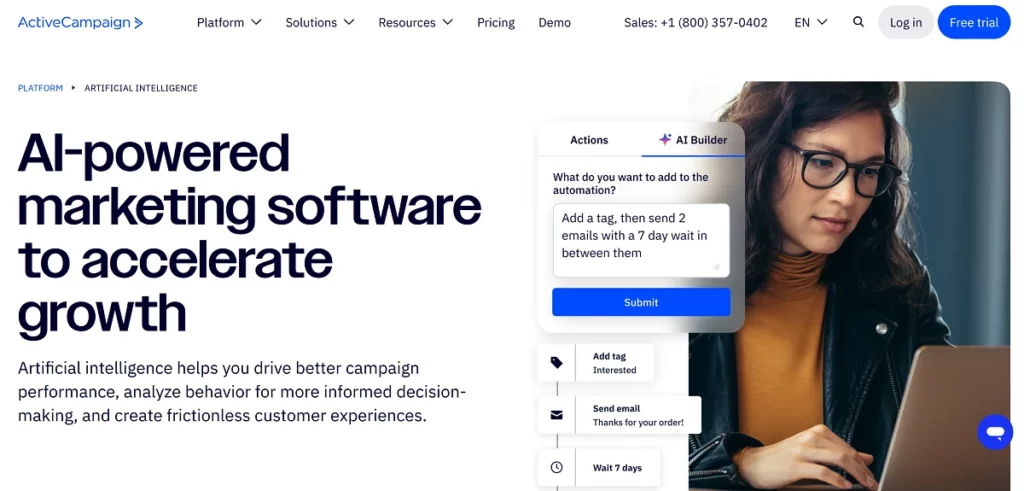
ActiveCampaign is gradually rolling out its AI features across the platform. So far, users can tap into tools like conditional content, predictive sending, and conversion probability scoring to better target and time their messages.
One of its more interesting additions is the AI brand kit — which allows the AI to generate email templates styled to match your brand’s look and feel automatically.
Related: Discover the best ActiveCampaign alternatives
3. GetResponse
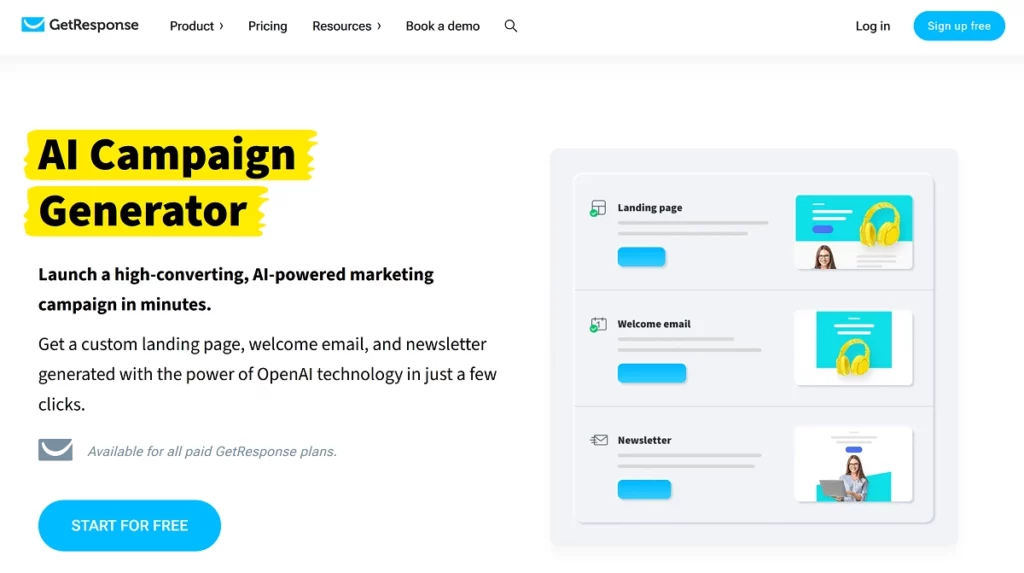
GetResponse has leaned into AI by letting you launch entire campaigns created end-to-end with AI. After answering a few simple questions, the platform can generate landing pages, autoresponder series, and newsletters — all aligned with your campaign goals and branding.
It also supports industry-specific messaging. By selecting the industry you're targeting, the AI adapts the content and tone to suit that audience — using terminology, pain points, and keywords that are more likely to resonate.
4. Mailchimp
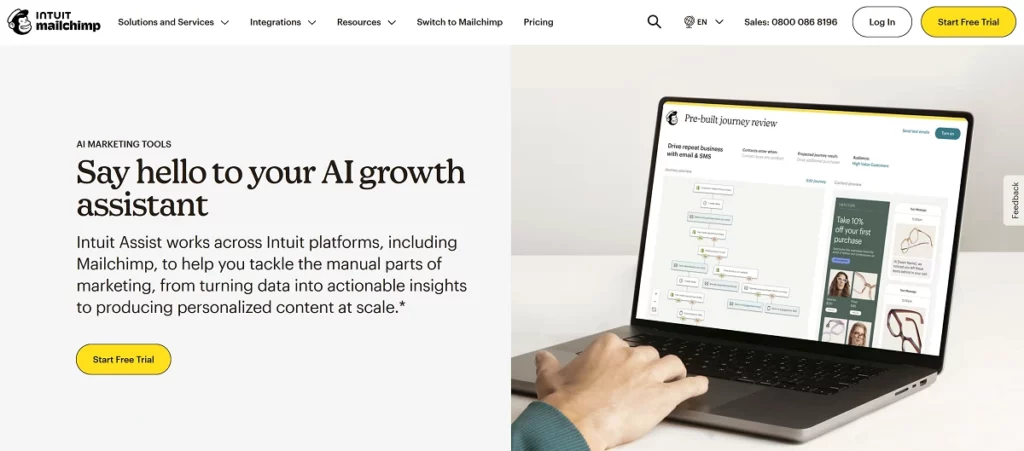
One of the best-known email marketing platforms, Mailchimp now includes helpful AI features powered by Intuit Assist.
This includes AI-generated content, smart send-time optimization, and fully pre-built and auto-scheduled abandoned cart emails.
Related: Discover the best Mailchimp alternatives
5. SendGrid
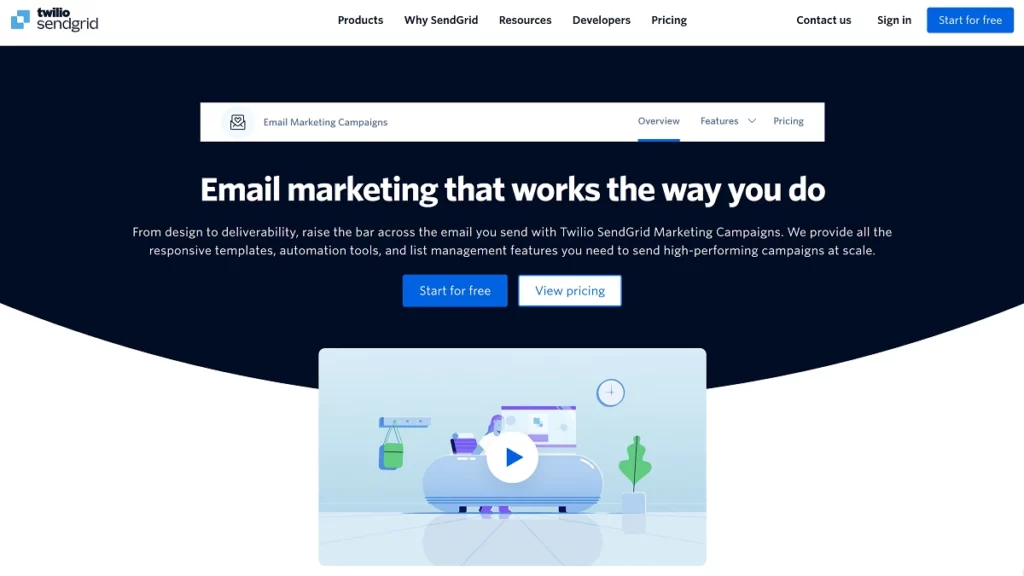
SendGrid (by Twilio) focuses its AI tools on improving performance where it matters most: deliverability and engagement.
Tools like send-time optimization, spam testing, and engagement scoring help ensure your emails land in inboxes at an unbeatable frequency.
It may not have the bells and whistles of some all-in-one platforms, but if email deliverability is your top priority, SendGrid is one of the best in the business.
Related: Discover the best SendGrid alternatives
6. Omnisend
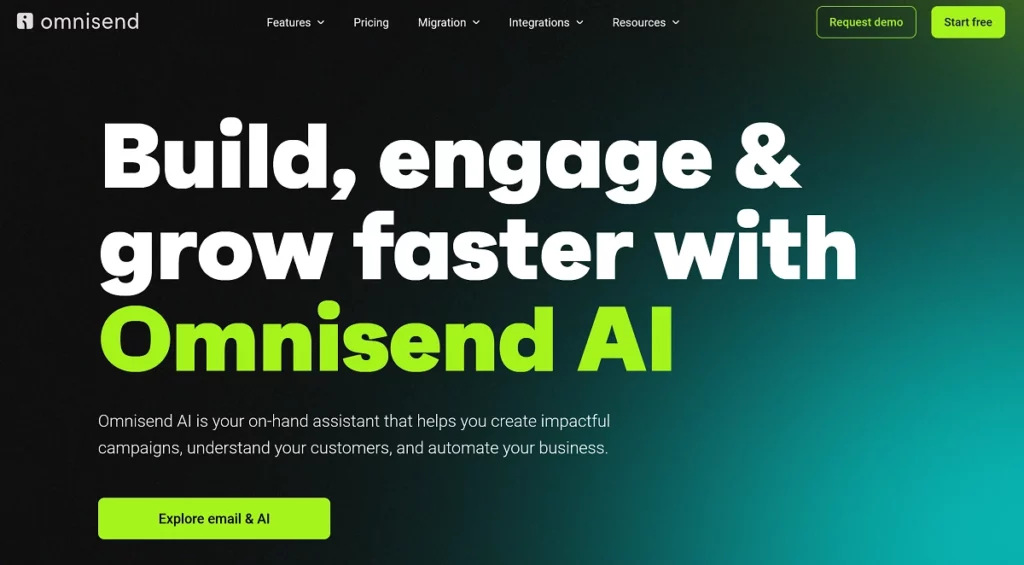
Omnisend is built specifically for ecommerce and, as you’d expect, most of its AI features are designed with store owners in mind.
It offers smart product recommendations, an AI-powered product description generator, and seamless integrations with platforms like Shopify and WooCommerce.
The platform also automatically segments customers based on metrics like purchase frequency, recency, and order value. This helps you identify your highest-value customers, so you can send targeted, personalized messages that keep them spending.
Related: Discover the best Omnisend alternatives
7. HubSpot
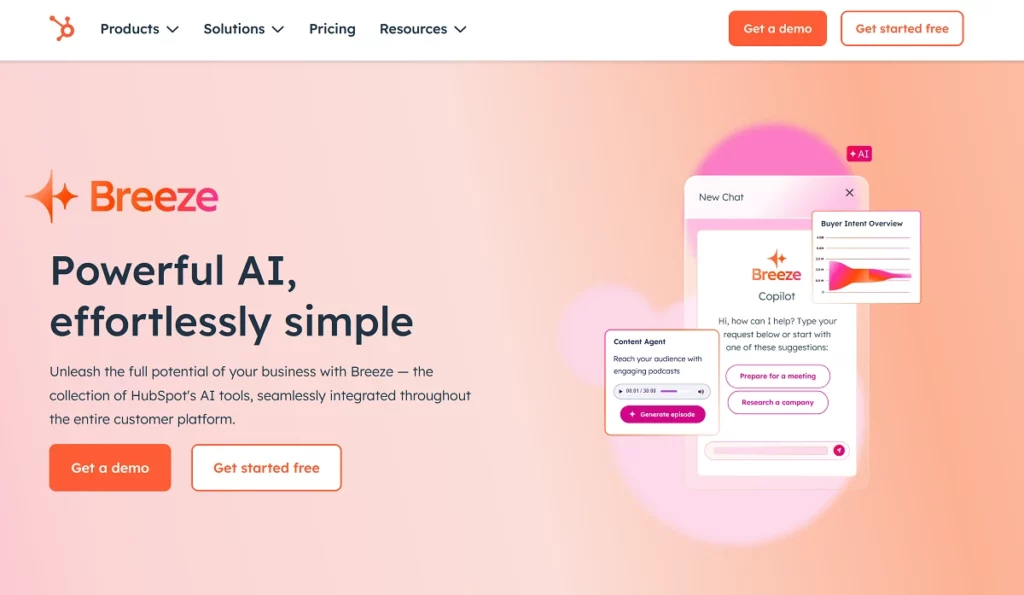
Hubspot’s AI solution, Breeze, can generate email copy, subject lines, and even follow-up messages based on your campaign goals — but that’s just the beginning.
Breeze integrates seamlessly with the broader HubSpot CRM suite and includes multiple specialised agents, each focused on a specific task — from content creation and social media posting to sales prospecting.
It can also repurpose high-performing content into new formats, making cross-channel marketing faster and more efficient than ever.
To boost your marketing efforts, Breeze also supports form shortening — automatically testing different field combinations and using autofill where possible to reduce friction and maximize submissions.
Related: Discover the best HubSpot competitors
8. Kit (formerly ConvertKit)
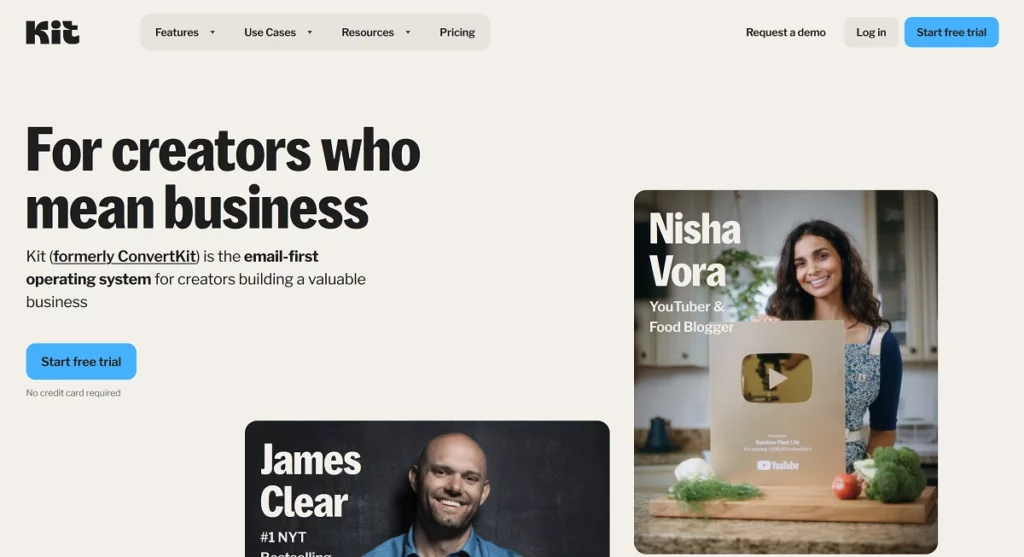
Popular among creators, Kit has begun introducing AI-assisted features like automatic email copy generation and smart tagging to streamline routine tasks. While lighter on AI compared to some others, it offers some unique features designed specifically for creators.
One standout is its Recommendations feature — which promotes your list in emails sent by similar creators, and vice versa. It’s a collaborative, community-driven approach that can help both parties grow their audience, without relying solely on paid channels.
Related: Discover the best Kit (formerly ConvertKit) alternatives
9. Rasa.io
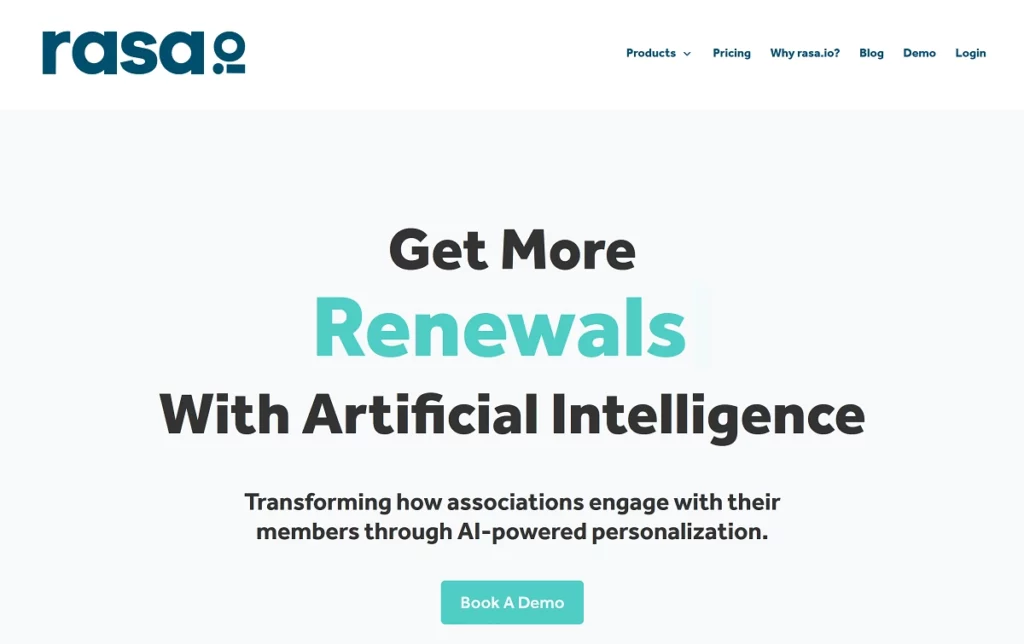
Rasa.io is a newer platform, designed from the ground up with AI at its core. It’s specifically for nonprofits and content-driven organisations that rely on regular newsletters to stay connected with their target audience.
Its standout feature is Smart Newsletters. You choose your content sources — such as your blog, industry publications, or trusted sites — and the AI curates personalized newsletters for each subscriber.
Over time, it learns which topics resonate most with each reader, what send times generate the best engagement, and how much personalisation is effective — continuously refining the newsletter to boost performance.
10. Optimove
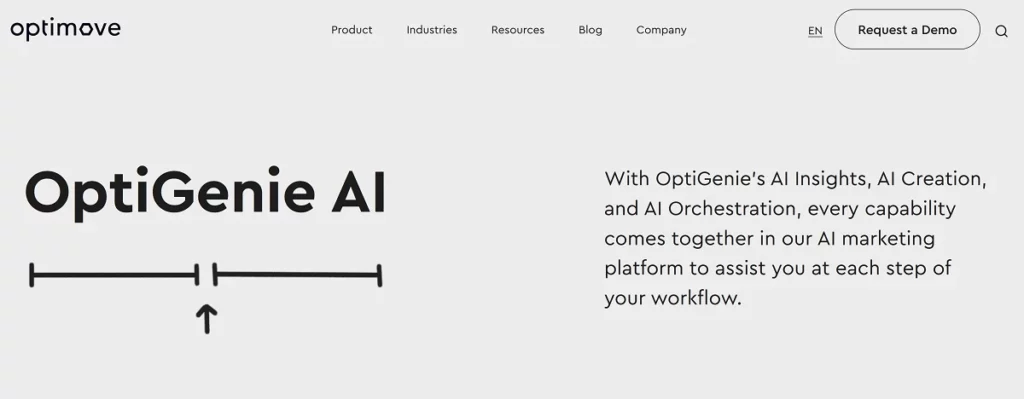
Optimove specialises in customer retention and advanced personalization, powered by its AI engine, OptiGenie.
The platform goes beyond email automation — OptiGenie actively monitors your campaigns and suggests ways to improve underperformance, which you can apply with a single click.
You can also ask OptiGenie to generate visual insights — like charts and graphs based on customer behaviour — translate campaign content, or make predictions about what individual customers are likely to do next.
It’s a data-driven platform built for marketers who want to make better-informed decisions.
Related: Discover the 7 best AI email writers
Choosing the best AI email marketing platform for you
AI is transforming the way we approach email marketing. From faster content creation to smarter targeting and higher conversion rates, it’s the biggest game-changer the industry has seen in years — or possibly ever.
While Brevo stands out with its market-leading AI assistant, Aura, every platform on this list brings something unique to the table.
Whether you're looking to grow your email list, integrate with ecommerce tools, or launch one-click, end-to-end campaigns, there’s a solution here that fits.
Still unsure where to start? Brevo’s free plan gives you a chance to explore Aura and see how AI can elevate your email marketing — no commitment needed.







